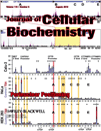
CRITICAL REVIEWS IN BIOCHEMISTRY AND MOLECULAR BIOLOGY
Scope & Guideline
Elevating Insights in Molecular Biology
Introduction
Aims and Scopes
- Molecular Mechanisms and Pathways:
The journal focuses on elucidating molecular mechanisms underlying biological processes, including gene expression, protein function, and metabolic pathways, often utilizing advanced biochemical and biophysical methods. - Disease Mechanisms and Therapeutic Insights:
A core area of interest is the exploration of disease mechanisms at the molecular level, providing insights that can lead to novel therapeutic strategies, particularly in cancer, metabolic diseases, and neurodegenerative disorders. - Innovative Methodologies:
The journal emphasizes the use of cutting-edge methodologies such as omics technologies, bioinformatics, and systems biology approaches to unravel complex biological questions. - Interdisciplinary Approaches:
CRBMB encourages interdisciplinary research that combines elements from various fields such as genetics, microbiology, and biophysics to address complex biological challenges. - Regulatory Mechanisms in Biology:
An important focus is on understanding the regulatory networks that control gene expression, protein function, and cellular responses, including epigenetic modifications and post-translational modifications.
Trending and Emerging
- Omics and Systems Biology:
There is an increasing trend towards the integration of omics technologies (genomics, proteomics, metabolomics) and systems biology approaches to understand complex biological systems and their behaviors. - Epigenetics and Gene Regulation:
Research focused on epigenetic modifications and their role in gene regulation and disease progression is on the rise, highlighting the importance of these mechanisms in understanding cellular responses and therapeutic targets. - Microbiome and Host Interactions:
Emerging studies on the microbiome's influence on host metabolism and health are becoming more prevalent, reflecting a growing recognition of the microbiome's critical role in various biological processes. - Post-Translational Modifications:
There is a notable increase in research on post-translational modifications of proteins, with implications for understanding their functional dynamics and regulatory roles in health and disease. - RNA Biology and Non-coding RNAs:
The exploration of RNA biology, including the roles of non-coding RNAs and RNA modifications, is gaining prominence, underscoring the complexity of genetic regulation and its implications for disease.
Declining or Waning
- Basic Biochemical Pathways:
There is a noticeable decrease in publications focusing exclusively on fundamental biochemical pathways without a direct application to health or disease, suggesting a shift towards more complex and applied research themes. - Traditional Enzymology:
Research centered on traditional enzymology techniques and studies appears to be waning, likely as newer technologies and methodologies offer more detailed insights into enzyme function and regulation. - Historical Perspectives in Biochemistry:
Papers that provide historical or retrospective analyses of biochemical discoveries have become less common, indicating a preference for forward-looking research that addresses current challenges in the field. - Non-molecular Perspectives:
Topics that focus on broader biological or ecological perspectives without a molecular focus are declining, reflecting a trend towards more molecularly-oriented research.
Similar Journals

BIOCHEMISTRY
Connecting researchers through high-quality biochemical insights.BIOCHEMISTRY is a premier academic journal published by the American Chemical Society, dedicated to advancing the field of biochemistry through the dissemination of high-quality research. With an ISSN of 0006-2960 and an e-ISSN of 1520-4995, this esteemed publication has been a vital resource since its inception in 1962 and continues to contribute to the scientific community, boasting a remarkable Q1 ranking in the field as of 2023. The journal's well-curated content emphasizes fundamental biochemical research, molecular genetics, and innovations in biochemical techniques, catering to a diverse audience of researchers, professionals, and students. Although not an open-access publication, BIOCHEMISTRY plays a crucial role in facilitating knowledge exchange and fostering academic collaboration globally, making significant contributions to the understanding of the biochemical processes that underpin life.

MOLECULAR BIOLOGY
Fostering Innovation in Biochemistry and GeneticsMOLECULAR BIOLOGY, published by PLEIADES PUBLISHING INC, serves as a vital repository for the dissemination of innovative research within the fields of biochemistry, genetics, and molecular biology. With an ISSN of 0026-8933 and an E-ISSN of 1608-3245, this journal has been a mainstay in the scientific community since its inception, embracing its deep historical roots from 1971 to the present. Recognized for its qualitative contributions, MOLECULAR BIOLOGY is ranked in the Q3 quartile for Biophysics and Q4 for Structural Biology, placing it among select journals in its domain. Researchers and students alike benefit from its rigorous peer-reviewed articles, which focus on all aspects of molecular mechanisms and interactions. The journal's inclusion in prestigious databases underlines its commitment to academic excellence. The editorial board is dedicated to fostering the sharing of influential findings, making it an essential resource for advancing knowledge and innovation in molecular biology.

BIOCHEMICAL AND BIOPHYSICAL RESEARCH COMMUNICATIONS
Where critical insights meet scientific excellence.BIOCHEMICAL AND BIOPHYSICAL RESEARCH COMMUNICATIONS, published by Academic Press Inc Elsevier Science, stands as a leading periodical in the fields of biochemistry, biophysics, cell biology, and molecular biology. With an ISSN of 0006-291X and an E-ISSN of 1090-2104, this esteemed journal has been a pivotal platform for the dissemination of groundbreaking research since its inception in 1959, continuing to publish influential findings through at least 2024. It holds a commendable Q2 ranking in Biochemistry and Q1 status in Biophysics as of 2023, reflecting its high impact and relevance in the field, supported by its strong Scopus rankings—ranking #43 in Biophysics and maintaining a presence in the top quartiles of several related categories. Although it is not an open-access journal, it provides critical insights and essential data that cater to researchers, professionals, and students keen on advancing their understanding of complex biochemical and biophysical processes. Its significant contributions to the scientific community underscore the importance of this journal as a reference point for innovative research and collaborative discourse.

JOURNAL OF CELLULAR BIOCHEMISTRY
Connecting Researchers Through Cutting-Edge Biochemical StudiesJournal of Cellular Biochemistry is a premier academic journal dedicated to advancing the field of biochemistry and cellular biology. Published by Wiley, this influential journal has a significant impact factor that underscores its relevance and authority within the scientific community. With its ISSN 0730-2312 and E-ISSN 1097-4644, the journal has been on the frontier of research since its inception in 1982, and is expected to continue publishing cutting-edge studies through 2024. As evidenced by its ranking in the 2023 Scopus Quartiles, it holds a rank of Q2 in Biochemistry and Q3 in both Cell and Molecular Biology, placing it among the top tiers of scientific journals in these disciplines. The Journal of Cellular Biochemistry serves as a vital resource for researchers, professionals, and students alike, providing a platform for the dissemination of innovative ideas and findings that shape our understanding of cellular processes and biochemical pathways. Though it does not currently offer Open Access options, its robust peer-review process ensures that each publication meets the highest academic standards, thus solidifying its esteemed position in the landscape of biochemical research.

Annual Review of Biochemistry
Illuminating the Path of Biochemical ResearchAnnual Review of Biochemistry is a premier publication in the field of biochemistry, renowned for its comprehensive and critical reviews that collate significant advancements and insights since its inception in 1946. Published by Annual Reviews in the United States, this journal maintains a prestigious position within the academic community, boasting a Q1 ranking in the biochemistry category for 2023, with an impressive Scopus rank of #4 out of 438, placing it in the top 1% of its field. With a commitment to excellence, it serves as an essential resource for researchers, professionals, and students striving to stay at the forefront of biochemical research. While the journal does not operate on an open-access model, it continues to provide key insights and knowledge that fuel innovation and discovery in the life sciences. As it converges research from various eras up to 2024, Annual Review of Biochemistry remains a vital contributor to the development of molecular biology and genetics, catering to the needs of a diverse readership keen on advancing their understanding and expertise in biochemistry.

Journal of Biochemistry
Unveiling the mysteries of life at the molecular level.Journal of Biochemistry, published by Oxford University Press, is a prestigious academic journal that has been at the forefront of biochemical research since its inception in 1922. With an ISSN of 0021-924X and an E-ISSN of 1756-2651, this journal serves as a platform for disseminating high-quality research in the fields of biochemistry, molecular biology, and medicine, holding impressive rankings such as Q2 in Biochemistry and Medicine (miscellaneous) in 2023. As of 2024, the journal continues to explore significant topics in these areas, offering valuable insights for researchers, professionals, and students alike. The journal does not currently offer open access, but it remains a vital resource for anyone in the biochemical community seeking to stay updated on the latest discoveries and advancements. With its rich history and dedication to scientific excellence, the Journal of Biochemistry is an indispensable part of the scholarly landscape.

Molecular Biomedicine
Bridging Disciplines for Impactful Biomedical ResearchMolecular Biomedicine is a prestigious peer-reviewed journal published by SpringerNature, dedicated to advancing the fields of molecular biology and molecular medicine. With a commendable Q1 ranking in both categories for 2023, this journal stands out for its rigorous exploration of the biochemical processes underlying health and disease. Operating out of Germany, Molecular Biomedicine aims to provide comprehensive insights into cutting-edge research, facilitating interdisciplinary collaboration among researchers, healthcare professionals, and students alike. The journal's impact is reflected in its Scopus rankings, placing it in the upper echelons of the fields of biochemistry, genetics, and molecular biology. As an open access platform, it commits to disseminating knowledge widely, ensuring that pivotal discoveries are accessible to all. Researchers looking to publish in a dynamic environment that prioritizes innovation and application in the biomedical sciences will find Molecular Biomedicine an ideal outlet for their work.

IUBMB LIFE
Unlocking Innovations in Molecular BiologyIUBMB LIFE is a prestigious, peer-reviewed journal published by WILEY, dedicated to advancing the fields of biochemistry, molecular biology, and cell biology. With an impressive impact factor and consistently ranked in the Q1 and Q2 categories across multiple relevant disciplines—including Biochemistry, Genetics, and Clinical Biochemistry—this journal has established itself as a leading platform for disseminating innovative research and critical reviews that propel scientific discovery. The journal spans a converged publication period from 1999 to 2024, providing comprehensive insights into the dynamic landscape of biochemical research. Researchers, professionals, and students alike are invited to explore its Open Access options, ensuring that groundbreaking studies are accessible to a global audience. As it continues to shape the future of life sciences, IUBMB LIFE remains a vital resource for those seeking to enrich their understanding and contribute to these rapidly evolving fields.

Biochemistry and Biophysics Reports
Elevating the discourse in biochemistry and biophysics.Biochemistry and Biophysics Reports, published by Elsevier, serves as a vital platform for the dissemination of innovative research in the fields of biochemistry, biophysics, cell biology, and molecular biology. With an Open Access model initiated in 2015, this journal aims to facilitate the unimpeded sharing of knowledge, allowing researchers, professionals, and students free access to significant findings and developments. The journal has established a presence in the academic community, currently holding a Q3 ranking in Biochemistry, Q2 in Biophysics, alongside its Q3 standings in both Cell Biology and Molecular Biology categories for 2023. These metrics underscore its commitment to quality and relevance, garnering attention with Scopus ranks reflecting its emerging influence. Located in the Netherlands, Biochemistry and Biophysics Reports continues to foster dialogue and collaboration among the scientific community through high-quality research outputs, contributing to advancements in understanding the intricate biochemical processes and biophysical principles that underpin life sciences.

Genes & Diseases
Innovating solutions through genetic research and discovery.Genes & Diseases, published by KEAI PUBLISHING LTD, is a premier open-access journal dedicated to advancing the fields of genetics, biochemistry, and molecular biology. Established in 2014 and headquartered in Beijing, China, this journal has quickly risen to prominence, securing a place in the prestigious Q1 quartile in Biochemistry and Genetics (clinical), as well as Q2 in Cell Biology and Q1 in Molecular Biology as of 2023. With a commitment to disseminating cutting-edge research, Genes & Diseases serves as a critical platform for researchers, professionals, and students alike, ensuring that high-quality scientific work is openly accessible to the global community. The journal's exceptional impact is underscored by its selective Scopus rankings, which reflect its influence and relevance in key scientific domains, making it an essential resource for those exploring the intersections of genetics and disease pathology.